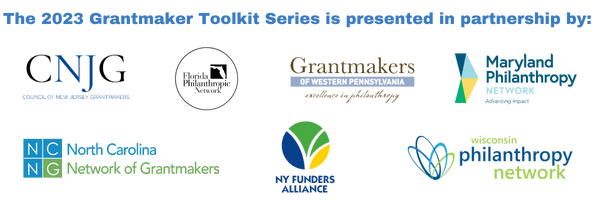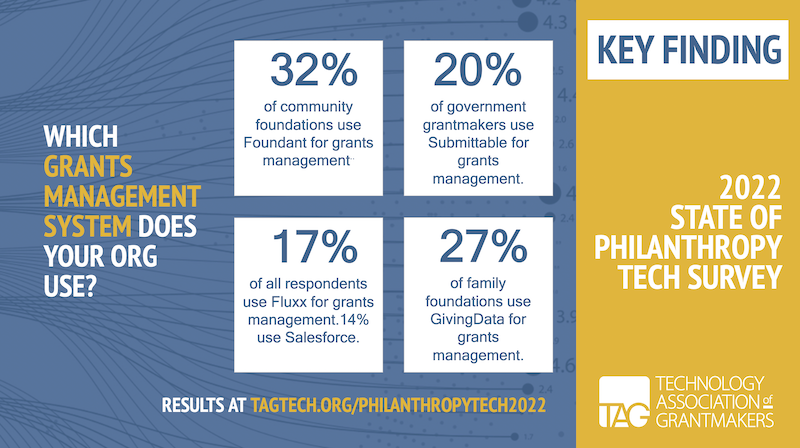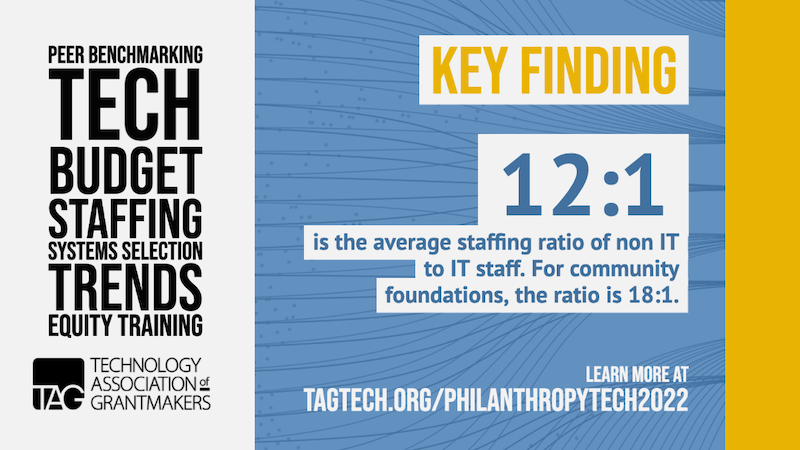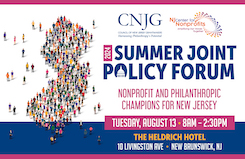Site Search
- resource provided by the Forum Network Knowledgebase.
Search Tip: Search with " " to find exact matches.
Foundation leaders have a unique opportunity to serve as powerful champions of their missions. Partnering with your grantees can amplify your impact. The following guide is designed to help you start having an honest conversation in the boardroom; a conversation about your foundation’s goals, approach, and, most importantly, vision for the future.
A key objective of the Scaling What Works initiative has been to translate insight and learning from grantmaker intermediaries involved with the Social Innovation Fund and share them with the broader philanthropic community. The fifth guide in the Lessons Learned series presents the benefits and challenges of partnerships between local and national funders, and highlights key considerations for both kinds of funders to foster success in their collaboration.
Amalgamated Bank is America’s socially responsible bank that specializes in supporting social change organizations, companies, and people working to make the world more just and sustainable. Nearly 100 years ago, immigrant women union members founded Amalgamated to provide banking service to their own community and to send money back to their mother countries. Since our founding, Amalgamated has been explicitly committed to environmental justice, economic inclusion, and the rights of working people. Today, Amalgamated is a full service financial institution supporting clients in 50 states across their banking, investment, and donor advised fund needs. At Amalgamated, we believe that you do not need to sacrifice services and rates to have a partner aligned with your values.
Banking and Investing With Your Values
Amalgamated Bank and its clients believe that where you bank matters. When you deposit your money at Amalgamated Bank, you know that it is being used in ways that align with your values and not invested in strategies that would further degrade our planet. Amalgamated believe that banks can be a force for good to curb climate change, advocate for gun safety, fight hate, and stand up for racial justice.
Here are some of the ways you can use your organization’s assets to build a more just and sustainable planet.
Bank with Your Values: Everyone’s bank deposits are lent out and invested in strategies that fuel our future economy. Simply, where you bank matters, because banks use your deposits to invest in other people’s ideas. It’s time to make sure that those ideas align with your values. At Amalgamated, we only invest in mission aligned companies and strategies that further a more just and sustainable planet. We lend hundreds of millions of dollars a year to clean energy, affordable housing, , sustainable agriculture, businesses owned by women, immigrants, and people of color, and more.
Invest with Your Values: Amalgamated believes that endowment and reserve account dollars should be used to achieve both a social and financial return. Our investment team specializes in risk adjusted options that screen out extractive industries and channel those resources to mission aligned strategies.
Give with Your Values: Amalgamated’s donor advised fund and pooled fund strategies help you move money to the causes you care about. Donors are able to move grants with ease using our innovative technology and financial acumen. Institutional funders are able to rely on our expert back office to manage their pooled and collaborative funds.
How Amalgamated Helps PSOs and Foundations
Amalgamated Bank is collaborating with United Philanthropy Forum and its members (including CNJG and its members) to offer preferred banking services. Every banking relationship is different, but Amalgamated and the Forum are committed to reducing costs, increasing returns, and improving financial operations. Specifically, CNJG members can expect:
- Discounted banking, depending on the organization’s specific needs
- Preferred private banker who understands the specific needs of PSOs and foundations and mission aligned investing strategies
- Full fee and rate analysis before you move to understand the financial gains of switching to Amalgamated Bank
- Consultation on credit needs including working capital, corporate credit cards, and more
- Bespoke portfolio development for ESG investment products
Learn More
To learn more about partnering with Amalgamated Bank, please visit their website or contact Caitlin Duffy, First Vice President of Philanthropy Banking, at [email protected] or (202) 721-0775.
Privacy Policy, Effective Date: April 15, 2009
We at the Council of New Jersey Grantmakers recognize that our relationships with current and prospective customers are based on integrity and trust. We work hard to maintain our customer’s privacy and are very careful to preserve the private nature of our relationship with our customers. Simultaneously, the very nature of our business requires that we collect or share certain information about our customers with other organizations or companies. Our policies and procedure for collecting and disclosing personal information is detailed below:
Collection of Information
Except as otherwise stated herein, we may collect public and nonpublic information about our customers from the following sources:
- Applications, forms and other information provided to us by our customers. This information may be collect in writing, in person, by telephone, electronically or by any other means. This information may include our customer’s name, physical address, email address, telephone number, employment information, income history, social security or federal tax identification number, and credit references.
- Transactions completed with Council of New Jersey Grantmakers or any of its affiliates. Our affiliates include financial institutions, trade references, governmental agencies or any other entity that we may deal with in the normal course of doing business. This information may include past payment history, funds availability and account usage.
- Consumer reporting agencies. This information may include account information and information about our customer’s creditworthiness.
- Information obtained through the public domain. This information may include real estate records, telephone numbers or any other information that is available to the general public.
Collection of Information Through Our Web Sites
We do not collect through our web site any “personally identifiable information” as that term is defined in the California Online Privacy Protection Act of 2003. We do collect statistical information regarding web site traffic but that statistical information does not identify the individual user or visitor.
Disclosure and Protection of Information Collected
To the extent permitted or required by law, we may disclose the information we collect, as described above, to banks, business partners, affiliates, and the representatives who service our customers. We do not sell any of our customer information. In order to make sure that our information is accurate, updated and secure, we take the following additional measures:
- Current Information. We attempt to keep our records regarding customer information current and accurate. If any of our customers have reason to believe that our records are not current or are inaccurate, we request that they contact Craig Weinrich. We respond to requests to correct inaccurate information in a timely manner.
- Limited Access. Our employees have been educated on the importance of customer privacy and confidentiality and have been trained in the proper handling of customer information and instructed to adhere to the strictest of security measures set in place. Employee access to a customer’s confidential information is only granted on a need-to-know basis.
- Electronic Information Secure. All information that is stored electronically is secured by reasonably available technology, including but not limited to firewalls and data encryption.
Changes to this Privacy Policy
Council of New Jersey Grantmakers reserves the right to change this Privacy Policy at any time. Please check this page periodically for changes. Your use of this site following the posting of changes to these terms will mean you accept those changes. Information collected prior to the time any change is posted will be used according to the policies in effect at the time the information was collected.
"What is the ongoing impact of social change on grantmaker support for grantees? How common is it for foundation staff to be back in the office? How can I leverage peer benchmarking to advocate for change within my organization?”
In July 2022, Technology Association of Grantmakers (TAG) conducted a survey to better understand the technology environment, practices, and perceptions in philanthropy. Now in its third version, the 2022 State of Philanthropy Tech survey compiled results from 277 grantmaking organizations throughout North America, the EU, and UK. The findings are fascinating!
Topics covered include:
· Technology budgeting and staffing
· Staff turnover and retention
· Remote, hybrid, and in-person work trends
· Cybersecurity breaches, training, and protections
· Trends in tool selection for grants management, remote work enablement, and more
Join TAG executive Director, Chantal Foster, and TAG Survey Committee Member, Tess Hanrahan of the Hewlett Foundation, for this interactive webinar that will explore key findings and trends just in time for your 2023 planning. TAG cultivates the strategic, equitable, and innovative use of technology in philanthropy. Their work builds knowledge, strengthens networks, and advances the social sector.
This program is for members of the following philanthropy-serving organizations: Maryland Philanthropy Network, Council of New Jersey Grantmakers, Florida Philanthropic Network, Grantmakers of Western Pennsylvania, Philanthropy Wisconsin, NY Funders Alliance, and North Carolina Grantmakers.
Webinar Recording
TAG’s State of Philanthropy Tech Survey Presentation Slides (and attached)
2022 State of Philanthropy Tech Survey
6 Tech Trends to Watch in Philanthropy
Selecting Systems for Community Foundations
Favorite Productivity Apps of Webinar Participants: Asana, Microsoft Planner, Calendly, Slack, Evernote, iCalender, Google Calendar, Doodle, DownDetector, Trello, Outlook, Monday.com, Microsoft Bookings, Docusign, OneNote

Steering Committee
Jorge Cruz, Executive Director, LISC Greater Newark
Linda Czipo, President & CEO of the New Jersey Center of Nonprofits
Jackie Edwards, Executive Director, Parents Inc of NJ
Victoria Fernandez, Director of Thriving Communities, Grunin Foundation; and Co-Founder, Nonprofit Professionals of Color Collective
Tyneisha Gibbs, Founder and Principal Consultant of 144th & Vine; and Co-Founder, Nonprofit Professionals of Color Collective
Theresa Jacks, President and CEO, Council of New Jersey Grantmakers
Bridget Phifer, Chief Executive Officer, Parkside Business & Community in Partnership
Rosalía Velázquez, Director of Strategic Partnerships, New Jersey Center of Nonprofits
Advisory Group
Keith R. Adams, Executive Director, NJVOAD
Carin Berkowitz, Executive Director, New Jersey Council for the Humanities
Elsa Candelario, Professor of Professional Practice, Latino/a/x Initiatives for Service, Training, and Assessment, Rutgers School of Social Work
Jane Cohen, Executive Director, Governor’s Office of Climate Action and the Green Economy
René O. Deida, Director, Corporate and Community Engagement, Prudential Financial, Inc.
Hans Dekker, President, Community Foundation of New Jersey
Craig Drinkard, Co-Executive Officer, Victoria Foundation
Bill Engel President, The Union Foundation
Andy Fraizer Executive Director, Community Foundation of South Jersey
Laurie Goganzer, President and CEO, YMCA of Greater Monmouth County
Jeremy Grunin, President, Grunin Foundation
Bob Guarasci, Founder & CEO, New Jersey Community Development Corporation
Susan Hoskins, Executive Director, Friends Foundation for the Aging
Sharnita C. Johnson, Vice President of Strategy, Impact and Communication, Victoria Foundation
Elaine E. Katz, Sr. Vice President, Kessler Foundation
Eddie LaPorte, Director, New Jersey Office of Faith Based Initiatives
Taneshia Nash Laird, President and CEO, Newark Symphony Hall
Tammy Rice Herman, Director of Grants & Strategies, New Jersey State Council on the Arts
John Thurber, Partner, Br'Island Group
Keith Timko, Executive Director & CEO, Support Center
Sandra Toussaint, President & CEO, United Way of Greater Mercer County
Allison Tratner, Executive Director, New Jersey State Council on the Arts
Mark Valli, CEO, NORWESCAP
Margaret Waldock, Executive Director, Duke Farms
Catherine Wilson, President & CEO, United Way of Greater Newark
Doing Good Better, a partnership of the Council of New Jersey Grantmakers and the New Jersey Center for Nonprofits, is a community of funders and nonprofits taking action against the power imbalances and racial inequities in philanthropy, nonprofits, and government.
This briefing will cover the impact of federal policy on public media and the importance of local news in informing communities about state and national policy. The panel will highlight potential funding cuts and possible funding opportunities, including public television and radio, and the potential for more direct engagement in state media policy.
Chris Daggett is Board Chair and Interim Executive Director of the New Jersey Civic Information Consortium. This nonprofit organization provides grants to local news organizations to meet evolving community information needs and to benefit the State’s civic life. He is also an independent consultant, providing strategic and operational advice to nonprofit and for-profit organizations, and he serves on numerous nonprofit boards. Immediately prior to his current work, Chris served for over eight years as President and CEO of the Geraldine R. Dodge Foundation. Previously, he served as Deputy Chief of Staff to Governor Thomas Kean, Regional Administrator of the U.S. Environmental Protection Agency, and Commissioner of the New Jersey Department of Environmental Protection. In addition, he was a managing director of William E. Simon & Sons, a private investment firm. In 2009, Chris ran as an independent candidate for Governor of New Jersey.
Vince Stehle has been the Executive Director for Media Impact Funders since 2011. Vince previously was program director for Nonprofit Sector Support at the Surdna Foundation, a family foundation based in New York City. Prior to joining Surdna, Stehle worked for 10 years as a reporter for the Chronicle of Philanthropy, where he covered a broad range of issues about the nonprofit sector. Stehle has served as chairperson of Philanthropy New York and on the governing boards of VolunteerMatch, the Nonprofit Technology Network (NTEN) and the Center for Effective Philanthropy.
Cost: Free for CNJG Members; $75 for Non Member Grantmakers
This program is only open to staff and trustees from grantmaking organizations.
Webinar Video
Programs in this Series:
March 13: Making Sense of Federal Policy: Understanding What it Means for NJ: Immigration
March 20: Making Sense of Federal Policy: Understanding What it Means for NJ: Health
March 27: Making Sense of Federal Policy: Understanding What it Means for NJ: Environment
April 3: Making Sense of Federal Policy: Understanding What it Means for NJ: Education
April 10: Making Sense of Federal Policy: Understanding What it Means for NJ: Housing
April 17: Making Sense of Federal Policy: Understanding What it Means for NJ: Media & Journalism
April 24: Making Sense of Federal Policy: Understanding What it Means for NJ: Arts
Resources
Reuters Institute: Shattered by a perfect storm: How Trump’s cuts are crippling journalism beyond the United States
NPR: Trump plans order to cut funding for NPR and PBS
Media Impact Funders: Meeting Series: Safeguarding Media and Journalism – April call
Protect Democracy: Ian Bassin, Co-Founder and Executive Director Bio
Website: reasons to be cheerful
A CNJG member queried our listserves on policies regarding: 1) number of vacation days for new full-time employees; 2) paid time off (PTO); and 3) working remotely. CNJG compiled the answers from responding members.
CNJG's Storify content from their Signature Events.
CNJG joined 250 delegates from the across the country over 3 days last week for Foundations on the Hill. Joining me, the CNJG delegation included Jeremy Grunin, President, Grunin Foundation, Calvin Ledford Jr., President, and Maria Spina, Manager, PSEG Foundation, Marianna Schaffer, Vice President of Programs, Geraldine R. Dodge Foundation, Catherine Wilson, President and CEO, United Way Greater Newark, and Lucy Vandenberg, Executive Director, Schumann Fund for New Jersey. Lucy serves as the co-chair of the CNJG Leadership and Policy Committee. For the last few years, we’ve also been joined by Linda Czipo, President and CEO, New Jersey Center for Nonprofits. Linda’s voice elevates our conversations and helps ground them in the work nonprofits do every day.

While we were in Washington, the Charitable Act was introduced by Senators Lankford and Coons during a press conference on March 1. The bipartisan bill makes charitable giving available to nonitemizers. Throughout our meetings, we urged our legislators to support this proposal, and hope it will be introduced on the House side soon. Several United Philanthropy Forum staff and FOTH participants attended the announcement, including Calvin, Maria, and Catherine.
CNJG’s Strategic Plan positions the Council to move beyond “defense of the sector issues,” and this year, in addition to advocating for charitable giving, we also advocated for the Nonprofit SEAT Act. This proposed legislation, if done right, could be a game changer. The bill proposes to create the White House Office on Nonprofit Sector Partnership, an interagency council, and advisory board. It directs the Bureau of Labor Statistics to release quarterly economic data on the nonprofit sector in the same way as other industries. While on the Hill, we heard the bill is likely to be introduced in the next few weeks.
In addition to advocating for legislation that supports our work, and educating Congress about the social sector, FOTH also helps build relationships with our Congressional delegation. We were thrilled to meet directly with Representatives Watson Coleman, Kim, and Payne, and newly elected Congressman Kean. Relationship building and partnerships are key approaches highlighted in our strategic plan because they are integral to moving forward philanthropy’s impact.



On Thursday, 3/9 at 12:00 noon, we’ll jointly host with the New Jersey Center for Nonprofits, a webinar outlining the 2023 CDS program with the Office of Senator Menendez. The Congressionally Directed Spending (CDS) program enables members of Congress to allocate existing funding for specific local projects by nonprofit organizations. Senator Menendez’ staff will outline the program, eligibility requirements, and application procedures. We hope you’ll join us, and encourage your grantees and nonprofit partners to attend. Register here.
It was quite an eventful 3 days – advocating for important policy, witnessing the introduction of the Charitable Act, strengthening and building relationships with our legislators, planning a webinar to inform the sector about funding opportunities, and engaging in activities that support our strategic plan.
Another important platform to strengthen and inform both the philanthropic and nonprofit sector in NJ is on May 23. The Conference for the Social Sector: Doing Good Better will explore how funders and nonprofits can address philanthropy’s power imbalances, rethink traditional grantmaking practices to better serve New Jersey communities, and position equity as a driving force. Register today!
Sincerely,
Theresa Jacks, President and CEO
Council of New Jersey Grantmakers
The Colloquium heard from an extraordinary line-up of morning and afternoon speakers, including Dave Cole, NJ Chief Innovation Officer. Clearly, the government is – and must be - on the front lines to ensure that AI ethically and responsibly benefits society. Having Dave join the panel served yet another function - introducing NJ’s philanthropic sector to the NJ Office of Innovation. One of CNJG’s important roles is connecting members with potential partners in government.
And while we’ve been deep in planning for the Colloquium, that’s not all we’ve been focused on. Over the past few months, CNJG has been at the forefront of fostering crucial dialogues between the philanthropic sector and state government, exploring philanthropy's role in civic engagement and democracy, and organizing a new convening for NJ’s nonprofit and philanthropic sector to engage in public policy collectively.
In partnership with the New Jersey Center for Nonprofits, we hosted two informational sessions for the Office of Legislative Services. In April, Center president and CEO Linda Czipo and I presented “Understanding NJ’s Nonprofit and Philanthropic Community: Role, Impact, Myths and Facts” to OLS staffers. Educating government officials and staffers about the social sector provides a grounding for future collaboration and potential partnerships. Additionally, because OLS is charged with drafting bills and conducting analysis on the impact of legislation, it is particularly important to have a good understanding of the charitable sector’s role in nurturing thriving communities. We hosted a second session in May focused on “Nonprofit Startup and Compliance Issues: A Legal Review.” Attendees came away with a working knowledge of the 501c3 family, state, and federal reporting requirements, tax rules, and an overview of the Center’s efforts to convene expert practitioners to recommend updates to the NJ Nonprofit Corporation Act in line with the modernization already done on the NJ Business Corporation Act. Attendees received continuing legal education units for session 2. Special thanks to William Engel, CNJG Policy Committee co-chair and president of the Union Foundation, and Frances A. McElhill, Archer & Greiner, long-time champion for the nonprofit sector, for joining Linda and me to present this session.
In June, we brought back one of our signature programs - Conversations with the Cabinet. Nearly 25 funders met with Commissioner Jacquelyn Suárez, NJ Department of Community Affairs, at their Trenton office to discuss current priority areas and possible opportunities for NJ’s philanthropic community to partner with state government on areas of mutual concern. We’re grateful to Commissioner Suarez and Assistant Commissioner/Director of Housing and Community Resources Janel Winter for their comprehensive presentation. As part of our discussion, we asked our friends at DCA to share examples of how philanthropy might leverage funding. One of the examples that Assistant Commissioner Winter shared was considering philanthropic investment in approved projects through the Neighborhood Revitalization Tax Credit (NRTC) program, which, while highly rated, does not receive funding due to a lack of corporate investment. If you could not attend the meeting and would like to learn more about these approved projects and other DCA programs, please get in touch with DCA Special Policy Advisor Renee Koubiadis. I’m also happy to provide an e-introduction to Renee.
On June 24, I was pleased to join several CNJG members at a funders’ briefing hosted by the Community Foundation of New Jersey and the NJ Civic Information Consortium. The Consortium provides grants to “foster increased civic engagement to organizations building and supporting local news and information in communities” in our state. During the briefing, we were introduced to Press Forward, a national movement led by inaugural director Dale Anglin to “strengthen our democracy by revitalizing local news and information.” Dale has deep roots in NJ, having served as Associate Director of Programs at the Victoria Foundation and co-chair of the Newark Funders Education Affinity Group for many years.
Looking ahead, don’t miss our first-ever Summer Joint Policy Forum – Nonprofit and Philanthropic Champions for New Jersey, on August 13, hosted by CNJG and the Center. The nonprofit and philanthropic communities are important contributors to well-informed policies for all residents of our state. This inaugural policy forum convening of nonprofit and philanthropic leaders and allies will discuss current and emerging nonprofit and philanthropic policy issues, voter engagement, and ways we can all become more involved.
As we look ahead, it has never been more important that philanthropy seeks out opportunities to partner with government, promotes civic engagement, and contributes to a healthy democracy. Among CNJG’s six policy priorities outlined in our policy agenda, we support a healthy democracy, engaged communities, and a collaborative environment between nonprofits, government, and philanthropy to move forward with this work. The connections forged during these – and future – engagements will serve as a foundation for an even more significant impact.
Sincerely,
Theresa Jacks, President and CEO
Council of New Jersey Grantmakers





